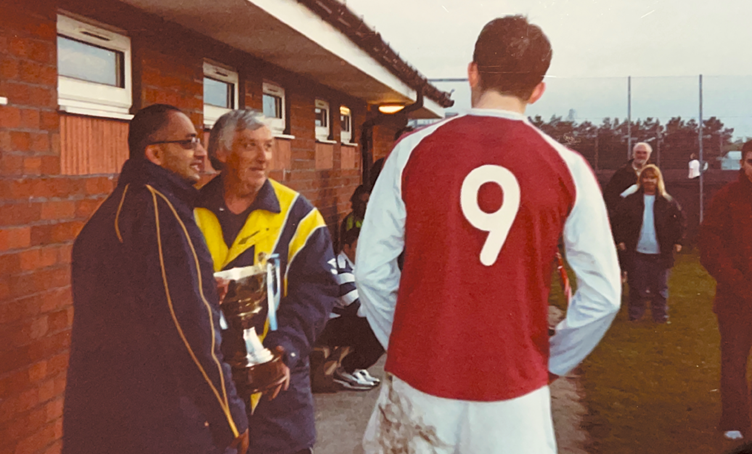Playing competitive football provided the very best times of my life. Until three years ago, when my health went haywire, I was playing football, two or three times a week, even into my young 40s. I know what you might be thinking: that’s pathetic, really, and utterly childish.
Even though I can no longer play, I watch football for several hours each week. Easily, I could watch football for every waking minute. And if I am struggling to sleep, when some people count sheep, I rank the best goals I ever scored, for I was a (very average) striker.
Today, on two occasions, I was asked, by men who are older than I am, and who still play football, when I’ll be back on the pitch. The truth is, that I doubt I ever will be. And that’s a mighty tough sentence to write.
……………………………………………………………………….
In recent weeks, I have been ruminating about how language influences our emotions. It goes without saying that we enter the world wordless, yet our capacity for emotion is innate. And as we grow, acquiring language, our newly acquired words become powerful tools which align with and articulate our emotional experiences. I think that while our emotions are intrinsic, language enriches and defines their expression, offering a lens through which we understand and communicate our feelings. It follows that if we have a limited vocabulary, our emotional expression can be stunted.
This journey through the language of emotions led me back to philosophy, where the words of Ludwig Wittgenstein offered a mirror to my thoughts. Reading Wittgenstein, or rather watching videos about him, I learned that my observations are nothing new. As I understand the thrust of his worldview, if one cannot describe something with words, then it cannot be meaningfully understood.
And that’s why I cannot articulate my feelings regarding my likely inability to play football competitively again. For I feel sad, but that doesn’t quite do it. “Melancholy” seems closer to it, but that doesn’t quite nail it. I feel empty, as I write about this, as if am mourning something, rather than someone. And “in mourning” is too dramatic and too final to capture how I feel. I’m also feeling immature that I miss the kicking of a ball.
I suppose I feel proud, too, for the length of my “career” and I’m nostalgic for my past triumphs. I also feel immense gratitude that football has taught me so much about life: mainly, that one cannot have the joy of winning without the opposite pain of losing- the yin-yang of all existence. I’m hopeful, too, that I’ll get back on the saddle, perhaps when medical advances arrive.
Simply put, to my knowledge there is no English word to describe my most human of experiences.
All of which reminds me of a powerful TED Talk: “How language shapes the way we think” by Lera Boroditsky. In it, Boroditsky, a cognitive scientist, discusses how the languages we speak shape the way we think about the world. Her most memorable story was about how speakers of German and Spanish describe bridges using words that align with the gender of the noun in their respective languages (bridges are feminine in German and masculine in Spanish), leading to descriptions that reflect stereotypically feminine or masculine characteristics. Germans tend to describe a bridge as “elegant” whereas Spanish speakers tend to describe the same bridge as “strong”. Weird, heh.
…………………………………………………………………….
These last five years I have found winter in North Yorkshire quite the challenge. Why humans left the tropics for these semi-Arctic conditions I will be forever irked.
Help though is at hand, for I have recently been introduced to the Norwegian word of “koselig,” which refers to a sense of coziness, comfort, and warmth, particularly in social settings or during the winter months. Koselig, I have learned, emphasises the importance of creating a warm atmosphere and enjoying the good things in life with good people – i.e. we should look forward to a period of “koselig” rather than fear it.
In North Yorkshire, we – me! –could learn to embrace winter, by using the Norwegian term.
……………………………………………………………………..
During my pursuit for the correct word to encapsulate my longings (for that is the wrong word) to play football, I have discovered the Turkish word “hüzün” which encapsulates a profound sense of melancholy or longing, embodying not just personal sadness but also a communal or existential grief. Hüzün, as I understand it, represents a deep emotional state that is both personal and collective, often reflecting the spirit or mood of a community or place.
Yet, “hüzün” doesn’t quite nail my football angst, given its application to the community more broadly. And the community doesn’t miss my footballing skills.
……………………………………………………………………….
With the help of AI, which had to read this babble, the word I was looking for is “saudade.” This Portuguese word, I understand, embodies a deep emotional state of nostalgic or profound melancholic longing for something or someone that one loves and which or whom is lost. Saudade, apparently, captures the blend of not only missing the joy of the past but also a recognition of its absence and the unlikely return, combined with a hopeful yet uncertain look towards the future. That’s what I was looking for.
So, today, I’m feeling “saudade’y”.
(Image is of me receiving my only cup as captain of the law school football team in 2004)










